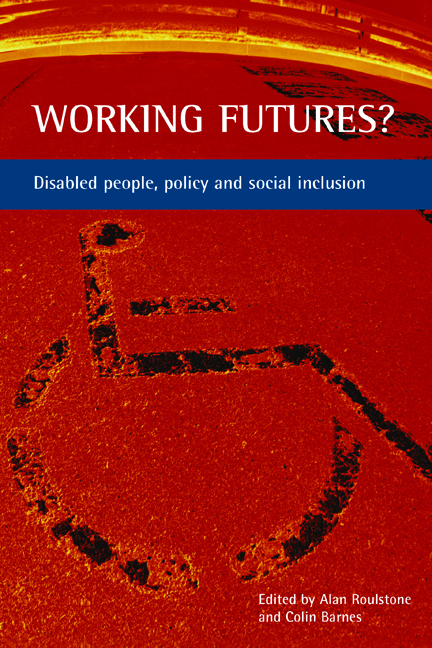Book contents
- Frontmatter
- Contents
- List of figures, tables and boxes
- Preface
- Acknowledgements
- List of abbreviations
- Notes on contributors
- Introduction Working futures: disabled people, employment policy and social inclusion
- Part One Work, welfare and social inclusion: challenges, concepts and questions
- Part Two The current policy environment
- Part Three Towards inclusive policy futures
- Index
- Also available from The Policy Press
sixteen - Barriers to labour market participation: the experience of Deaf and hard of hearing people
Published online by Cambridge University Press: 18 January 2022
- Frontmatter
- Contents
- List of figures, tables and boxes
- Preface
- Acknowledgements
- List of abbreviations
- Notes on contributors
- Introduction Working futures: disabled people, employment policy and social inclusion
- Part One Work, welfare and social inclusion: challenges, concepts and questions
- Part Two The current policy environment
- Part Three Towards inclusive policy futures
- Index
- Also available from The Policy Press
Summary
Introduction
The labour-market situation of Deaf , deafened and hard of hearing people has never been robustly and systematically researched in the UK. There are beliefs that these groups can be poorly served by public careers and employment services, can be restricted by service providers’ and employers’ assumptions about suitable work, may take jobs below their abilities, may earn less than hearing people and see restricted opportunities for job mobility and career progression. In sum, it is believed that Deaf and hard of hearing people face multiple and cumulative disadvantages in accessing worthwhile jobs and pursuing careers.
This chapter reviews the research evidence in support of these beliefs about social exclusion from and within the labour market. Research taking deafness and employment as the sole or main focus is extremely rare in the UK, however, and some supporting evidence is drawn from research in the US.
Labour market participation
Deaf and hard of hearing people are not a homogeneous group. The great majority of hard of hearing people develop a hearing loss with increasing age and are likely to use residual hearing, amplification and lip-reading within everyday interactions. An estimated 128,000 people in the UK under the age of 65 became ‘deafened’ as adults as a result of an accident or disease and often rely on lip-reading and text communication (RNID, 2000a). It is thought that around 50,000 to 70,000 deaf people use British Sign Language (BSL) (RNID, 2000b), mostly people who were born deaf or became deaf in early childhood, and they generally identify with Deaf culture that they claim is both generated and promulgated through the use of BSL (Padden, 1980; Harris, 1995).
It is apparent that people who have been deaf from birth or early childhood, adults who become deafened and those who acquire partial hearing loss face barriers in the labour market which relate to differing communication requirements and the point at which hearing impairment occurs within the life course. A few studies have focused on the employment experiences of some groups, notably young people and Deaf people. However, large-scale surveys, notably the Labour Force Survey (LFS), unhelpfully mask the differences in communication requirements and histories of hearing impairment by using the catchall category ‘difficulty in hearing’.
- Type
- Chapter
- Information
- Working Futures?Disabled People, Policy and Social Inclusion, pp. 233 - 244Publisher: Bristol University PressPrint publication year: 2005

